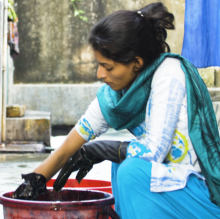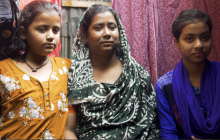Barsha, whose real name isn’t being used to protect her identity, was 11 when her mother started forcing her to traffic drugs between India and Bangladesh. She was caught several times by police and was afraid of her mother, so she ran away from home and lived in a railway station. During that time she was forced into sex work and raped numerous times.
Barsha’s life seemed to take a happy turn when got married, but her husband didn’t know about her past and he was angry when he learned the truth. He became addicted to drugs and made Barsha’s life very difficult. When he left her, Barsha moved back to the railway station, where she gave birth to their son. Out of options, she went back to sex work shortly afterwards in order to support her child.
“My life was very difficult before coming to Pobitra,” she says.
Pobitra, a Mennonite Central Committee (MCC) partner in Mymensingh, Bangladesh, is helping hundreds of women move out of sex work by offering a safe haven to learn job skills.
Through tears, Barsha explains that when she was 18, she learned about Pobitra and made the decision to leave sex work, a requirement for joining the program: “When I looked at my son, I decided to leave my earlier life, so that my past will not affect him and he can live a better life.”
From there, she was given $2.40 per day and a caring environment to learn to read and write Bangla, and how to make handicrafts. Pobitra offers training in good family relationships and child protection, family planning, health and hygiene, human rights and professional communication, among other things. The organization also offers childcare so participants like Barsha don’t have to be separated from their children.
Now 19, Barsha has a number of different job skills, but more importantly, she’s reclaimed her dignity and found a new family through Pobitra. “By leaving that path, you will find everything here. You will receive love, care and honour here,” she explains.
Chandni, whose real name isn’t being used to protect her identity, also benefitted from Pobitra after the left the sex trade. She lived in a train station and suffered from mental health problems before participating in the job-training program.
“When we found [Chandni] at the railway station she didn’t have any clothing,” says Sultana Jahan, Pobitra’s project coordinator. “She was only using a small top and a piece of cloth to wrap her. We took her to the program, but she was out of sense. She couldn’t talk properly, she couldn’t eat properly.” She explained staff worked with Chandni to get her where she is now.
The Pobitra staff and students took care of Chandni while she recovered and learned job skills.
Chandni and her husband have two children and now own a roadside confectionary shop, where they sell tea, biscuits, cigarettes and cold drinks.
“I can dignify my life,” she says. “The customers are respecting me, which is helping me to run the business. . . . If I were not been to Pobitra, it was not possible and I didn’t get respect from the people.”
Chandni is content with her life but has high hopes for her two daughters. “They will be educated and self-dependent,” she says. “My future is my daughters, so I am expecting them to be educated, and [they] will not do roadside business like me. Also, they will have a happy family in future.”






Add new comment
Canadian Mennonite invites comments and encourages constructive discussion about our content. Actual full names (first and last) are required. Comments are moderated and may be edited. They will not appear online until approved and will be posted during business hours. Some comments may be reproduced in print.